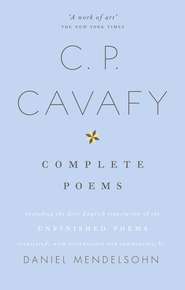скачать книгу бесплатно
They hadn’t seen, in Delphi, such beautiful gifts in centuries
as those that were sent by the two, the Ptolemies,
the rival brother kings. Ever since the priests accepted them,
though, they’ve been worried about the oracle. To frame it
with finesse they’ll need all of their expertise:
which of the two, two such as these, must be displeased.
And they convene at night, secretly,
to confer about the Lagid family.
But look, the envoys have come back. They take their leave.
Returning to Alexandria, they say. They no longer have
need of oracles. The priests are overjoyed to hear this
(it’s understood they’ll keep the fabulous gifts)
but they’re also bewildered in the extreme,
clueless as to what this sudden lack of interest means.
For yesterday the envoys had grim news of which priests are unaware:
At Rome the oracle was handed down; destinies were meted there.
[1915; 1918]
Aristobulus
The palace is in tears, the king’s in tears,
King Herod inconsolably laments,
the entire country is in tears for Aristobulus
who so needlessly, accidentally drowned
playing in the water with his friends.
And also when they hear the news elsewhere,
when it gets as far as Syria,
even many of the Greeks will be distressed:
the poets and the sculptors all will mourn,
for the renown of Aristobulus had reached them,
and any vision of theirs of what a youth could be
never matched the beauty of this boy.
What statue of a god could Antioch boast
that was the like of this boy of Israel?
The Throne Princess laments and weeps:
his mother, the greatest of the Jewesses.
Alexandra laments and weeps over the calamity.—
But when she finds herself alone her anguish alters.
She groans; she seethes; she swears; she calls down curses.
How they made a fool of her! How they gulled her!
How, in the end, they had got their way!
They’ve laid the house of the Hasmoneans in ruins.
How did he manage it, that criminal of a king;
that charlatan, that miscreant, that scoundrel?
How did he manage it? What a diabolical plan,
for Mariamne not to have noticed a thing.
Had Mariamne noticed, or suspected,
she’d have found a way to save her little brother;
she’s queen after all, she could have managed something.
How they’ll gloat now, how they’ll exult in secret,
those spiteful women, Cypros and Salome;
those vile trollops, Cypros and Salome.—
And to be powerless, to be compelled
to pretend as though she believed their lies;
to be unable to go to the people,
to go outside and cry out to the Jews,
to tell, to tell how the murder had been done.
[1916; 1918]
Caesarion
In part to ascertain a certain date
and in part to while away the time,
last night I took down a collection
of Ptolemaic inscriptions to read.
The unstinting laudations and flatteries
are the same for all. All of them are brilliant,
glorious, mighty, beneficent;
every undertaking utterly wise.
As for the women of the line, they too,
all the Berenices and the Cleopatras, are wonderful too.
When I successfully ascertained the date
I’d have finished with the book, if a tiny,
insignificant reference to King Caesarion
hadn’t attracted my attention suddenly. . . . . .
Ah, there: you came with your indefinite
charm. In history there are only a few
lines that can be found concerning you;
and so I could fashion you more freely in my mind.
I fashioned you this way: beautiful and feeling.
My artistry gives to your face
a beauty that has a dreamy winsomeness.
And so fully did I imagine you
that yesterday, late at night, when the lamp
went out—I deliberately let it go out—
I dared to think you came into my room,
it seemed to me you stood before me: as you must have been
in Alexandria after it had been conquered,
pale and wearied, perfect in your sorrow,
still hoping they’d have mercy on you,
those vile men—who whispered “Surfeit of Caesars.”
[1914; 1918]
Nero’s Deadline
Nero wasn’t worried when he heard
the prophecy of the Delphic Oracle.
“Let him beware the age of seventy-three.”
He still had time to enjoy himself.
He is thirty years old. It’s quite sufficient,
this deadline that the god is giving him,
for him to think about dangers yet to come.
Now to Rome he’ll be returning a little wearied,
but exquisitely wearied by this trip
which had been endless days of diversion—
in the theatres, in the gardens, the gymnasia. …
